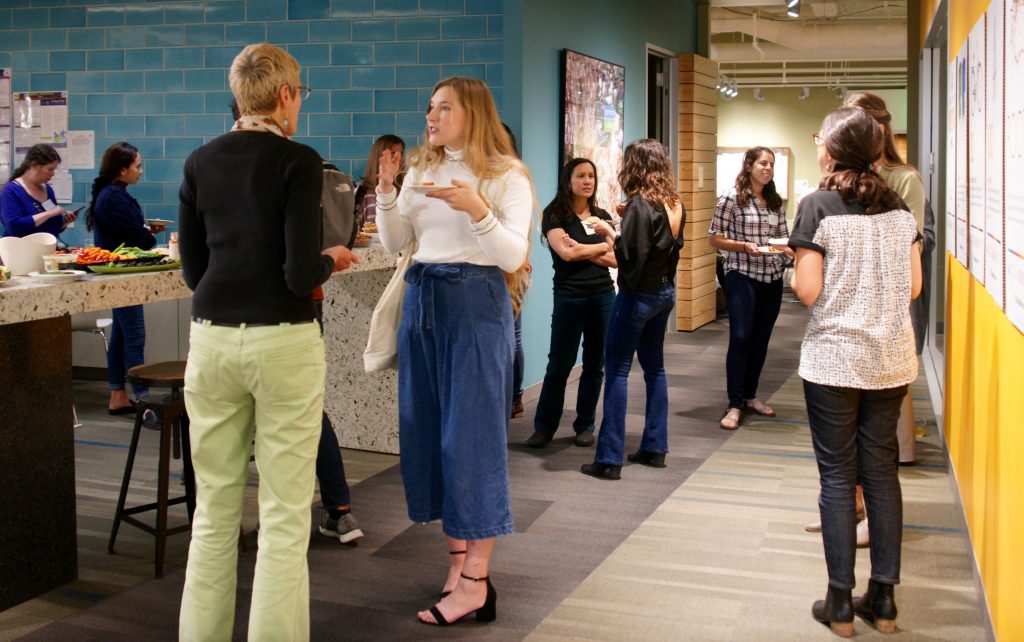
By WEN President, Nikole Reaksecker
For many of us, networking is a painful chore that we tend to engage in when we are in transition. Panicked and looking for work? Bored in your current position and longing for a fresh start? Feel like you have reached a plateau in your career? I can almost guarantee that attending a networking event is at the top of your to-do list and you feel a knot in your stomach the size of the plastic garbage patch floating in the Pacific Ocean.
Have you ever stopped to think about why networking is so uncomfortable? Why it raises so many of our insecurities? Why we dread the task as much as (if not more than) going to the dentist? I have. The stakes feel high. Instinctively, we all know that we don’t accomplish anything in this world alone and that networks are vital to our survival. We also put a tremendous amount of pressure on ourselves to be perfect. We compare ourselves to others. We worry that we will be judged. As introverts, we feel self-conscious and over-stimulated. As extroverts, we feel energized, but can spend so much time talking about ourselves that we fail to learn about the other person. Networking is challenging because it causes us to ponder how we present ourselves to the world.
The other reason many of us dislike networking so intensely is that the task feels very transactional. The idea that we would cultivate a relationship for the sole purpose of trying to receive a benefit feels unnatural and unsettling. We know that a strong network is important to our success. Yet, we also have a limited amount of time and want to be strategic in how we grow our set of connections. That said, it feels strange and off-putting to specifically seek out high-level contacts because we are making a value judgment about who is and who is not important. Not to mention that asking for help is difficult, especially when it feels like we are using the relationship for our personal gain. Because we feel uncomfortable, we hesitate to reach out, to connect with old colleagues and new acquaintances. We do not want to inconvenience anyone, but we are more than happy to help another.
As women, we approach networking in an entirely different way than men. Women tend to form fewer, deeper relationships. Men tend to build broad and shallow networks. According to Joanna Barsh and Susie Cranston, authors of How Remarkable Women Lead, men’s networks give them “a wider range of resources for more career opportunities” and the typical male executive has “a network many times the size of a woman’s network at the same level.” Data shows that people with strong networks and mentors enjoy more promotions, higher pay, and greater work satisfaction. Differences in how men and women network place women at a disadvantage. Our networks are smaller and more intimate, limiting our exposure to new ideas and opportunities. Everyone has heard of the “old boys network.” Perhaps, it is time to re-envision networking, to transform this task to suit our inherent strengths, and to create a space for women helping women?
Connectedness is critical not only to success in our careers, but also to a sense of deeper satisfaction. “A leader with strong connections to colleagues and team members can share her sense of meaning and mission – inspiring others to make extraordinary commitment to the work, too. She can also draw wisdom, energy, and joy from those whom she connects with,” proclaim Brash and Cranston. Remaining open to new connections and ideas keeps us growing and learning. A strong network provides emotional support during times of stress – helping to restore energy and optimism.
As women, we naturally nurture and build community. When we view networking as cultivating an ecosystem based on relationships, we see the interconnections and interdependencies. When we celebrate each individual’s contributions, we begin to feel less self-conscious and to see new ways to connect. When we focus more on how we can help someone else, we start to forge the strong relationships that make the difference between failure and success. When we think about networking as simply reaching out, showing interest in another person and offering help, the task feels easy and fun.
To broaden our perspective on networking, Barsh and Cranston encourage us to “Imagine the environment where you most want to be. Then fill the space with people, each of whom offers something special. Now place yourself among them.” The warmth, the sense of belonging that you feel is the foundation of network design and is what we aim to foster at the Women’s Environmental Network (WEN.) We strive to create a safe, comfortable atmosphere where you can connect with other women who share a similar vision. Our structured, facilitated speed networking events take the fear out of networking!
This month, we would love for you to join us at the Young Professionals in the Environment Mixer on July 17th at Perennial in San Francisco and at our Speed Networking Event on July 25th at Spice Monkey in Oakland. We hope to see you there!
